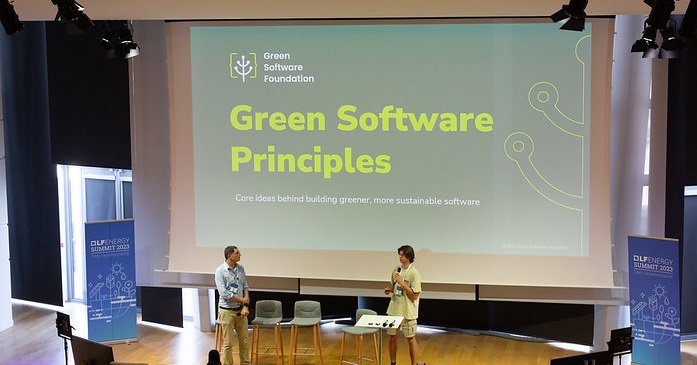LF Energy Summit 2023 Recap: Green Software Principles for a Sustainable Future with Dan Benitah & Szymon Duchniewicz of Avanade
In a world where environmental concerns are at the forefront of global discussions, even the software development industry is taking steps towards a greener future. At LF Energy Summit 2023, two experts from Avanade, Dan Benitah and Szymon Duchniewicz, presented a session on “Green Software Principles and Embedding Carbon Awareness in Your Applications” (video follows below). Let’s dive into the key points of their presentation and explore how developers can contribute to a more sustainable future.
The Green Software Foundation: Making an Impact
Dan and Szymon kicked off their presentation by introducing the Green Software Foundation (GSF), a non-profit organization dedicated to educating software professionals on sustainable practices. The GSF’s mission is to reduce the environmental impact of software through training, research, and advocacy. By addressing three scopes defined by the greenhouse protocol—direct emissions, indirect emissions from electricity generation, and indirect emissions from the supply chain—the GSF aims to empower developers to make a positive impact on the environment.
Green Software Principles: Focusing on Efficiency
The duo emphasized three essential Green Software Principles for sustainability: energy efficiency, hardware efficiency, and carbon awareness. Energy efficiency involves consuming the least amount of energy possible, while hardware efficiency focuses on optimizing the efficiency of the hardware on which the software runs.
Carbon Awareness: A Key to Reduce Emissions
Carbon awareness is a critical aspect of the Green Software Principles and deserves special attention. It revolves around understanding and leveraging the varying carbon intensity of electricity sources. By shifting workloads to times and locations with cleaner energy sources, software developers can significantly reduce carbon emissions. The Carbon Aware SDK developed by the GSF offers tools to help developers embed carbon awareness in their applications.
The SDK integrates with third-party data sources to access carbon intensity information and allows developers to predict and plan for future shifts in carbon intensity. By abstracting data providers, the SDK makes it easier to work with different sources, promoting transparency and reducing the chances of greenwashing.
Making Business Cases for Sustainability
Finally, Dan and Szymon stressed the importance of collective effort in achieving a greener future. By taking small steps together, software professionals can create a massive impact on the environment. The GSF provides additional training resources, such as the https://learn.greensoftware.foundation program, to help individuals and companies embrace sustainable practices.
As the world embraces the importance of environmental conservation, every industry, including software development, must do its part. With organizations like the Green Software Foundation leading the way, software professionals have the tools and knowledge to build a greener, more sustainable future.
